Key Takeaway:
- Couples can legally marry themselves without the need for a judge or officiant, which is known as self-solemnization. This option is available in some states throughout the U.S., including Pennsylvania, Colorado, Wisconsin, Montana, and California (with a special non-clergy license).
- Marriage certificates obtained through self-solemnizing are often recognized by other countries, making it a suitable option for those seeking adventure and flexibility in their wedding planning. Weddings can take place without a third-party officiant and in customizable locations.
- It is essential to research and understand each state's specific regulations and policies carefully, as some states require witnesses or may not allow self-solemnizing. Additionally, all necessary documents must be obtained and completed, including a marriage license and valid identification.

Self-Solemnizing Marriage Ceremonies
Self-solemnization is legal in a few U.S. states, including Colorado, Pennsylvania, Wisconsin, and D.C. Couples can obtain a marriage certificate from their county clerk's office, just like in any other wedding ceremony. However, it's important to note that not all states recognize self-solemnizing marriages and some require that a third-party officiant be present, so it's important to check with the local laws and regulations in your state before deciding on a self-solemnizing marriage.
In conclusion, self-solemnizing marriages can be a unique and intimate way to celebrate your love, but it's essential to ensure that it's legally recognized in your state before making any commitments.
Definition of Self-Solemnization
Self-Solemnization is a marriage ceremony where the bride and groom are the officiants. So, they preside over their own ceremony, and don't need an authorized person or religious leader.
The benefits of this type of marriage include no requirement for an authorized person. This lets couples be flexible in terms of when and where they can hold their ceremony. And, they have full control of every aspect of their wedding.
Regulations for Self-Solemnization vary from state to state in the US. So, couples should research their local regulations to ensure their marriage is legal. This may include witness presence, specific documents, or other procedures.
It's important to know that legally marrying yourself is not recognized in any state. So, while you can marry someone else in a self-solemnized ceremony, you can't divorce yourself.
Legality of Self-Solemnizing in the U.S.
Self-solemnizing marriage ceremonies are a popular choice for couples who want to officiate their own wedding without an officiant. But, the legality of self-solemnizing marriage varies by state.
Some states, like Colorado, Pennsylvania, and Wisconsin, recognize self-uniting marriages. Other states need a separate person to solemnize the ceremony.
For couples opting for self-solemnization, it offers a more private ceremony and frees them from finding and hiring an officiant. But, it's important to know not all states allow it. Legal recognition may be different in each state.
If considering self-solemnization, couples should research the current regulations in their state. They need to obtain and properly fill out all required documents. This is to make sure their ceremony is legally conducted and they will have no issues with legal recognition later.
Self-solemnization might be the option for couples looking for a unique mountain elopement or a more personalized and intimate ceremony. But, they must double-check state laws and policies to ensure their wedding is legally recognized in their state.
Marriage Certificates and Recognition
Marriage certificates are legal documents that prove a marriage between two people. They are given by the government for recognition. This recognition has many benefits, like spousal rights, tax advantages and inheritance rights.
In some states, there is no need for an official to do the marriage ceremony. This means no certificate is needed. But, it is important to check if self-solemnization is legal in the state of residence or where the ceremony will be held. It is wise to research the relevant laws and requirements of the state before continuing.
Marriage certificates have been used for centuries. In the past, public clerks in England did not perform religious ceremonies. So, marriages were conducted by couples, without any help from officials. The certificates show that the couple has followed the laws of the state, unless it permits self-marriage.
Don't worry about finding the right official. Consider the freedom of self-solemnization. But, first research the state laws and requirements.
Self-Solemnizing vs. Traditional Weddings
If you're considering getting married, you may be wondering about the various ways in which you can exchange vows without involving a third party. In this section, we'll discuss the benefits of self-solemnizing and how it stands in contrast to traditional weddings. We'll also explore the advantages of removing the need for an officiant, as well as the appeal of private ceremonies and elopements outdoors.
Benefits of Self-Solemnizing
Do you want a private, personalized way to get hitched? Self-solemnizing your wedding might be the right choice! You and your partner can officiate your own marriage without a third-party.
Benefits include: privacy, flexibility, and avoiding the cost of traditional weddings. Plus, you can choose any meaningful place for your ceremony.
Self-solemnizing lets you create a ceremony tailored to your beliefs, practices, and preferences. You have full control - making for a special experience that reflects your relationship.
But before investing too much time and money, check local laws to make sure self-solemnizing is legal in your area. If you live in Colorado, there's an extra bonus: they recognize dogs as "deputy dog-ma-rriers," so your furry friend can officiate your ceremony alongside you!
If you want to tie the knot on your own terms, consider the benefits of self-solemnizing. Create a unique, memorable celebration that's perfect for you and your partner.
.jpg)
Removing the Need for an Officiant
Self-Solemnizing weddings are becoming popular in many states across the US. It allows couples to personalize their wedding ceremony without conforming to traditional rituals. However, each state has different requirements for performing a self-solemnized wedding.
Cost savings is a great benefit of this innovative approach. Couples can even elope to a mountain without needing an officiant or witnesses. Julia shared her experience on Offbeat Bride. She and her life-partner hiked to a Rocky Mountain National Park in Pennsylvania and exchanged vows with no one else present.
If you're looking for a natural, personalized touch to your wedding - consider self-officiating. Nature will be the only witness to your new union.
Private Ceremonies and Eloping Outdoors
Tying the knot is becoming more and more popular with private ceremonies and elopements. Couples are drawn to this trend due to the intimate and romantic atmosphere it creates. Self-solemnizing marriages don't require a religious or civil celebrant, making the ceremony even more special.
Couples have freedom to personalize their vows and choose a special location. Natural settings like mountains or beaches make for stunning backdrops. Self-solemnization simplifies the process by eliminating the need for an officiant.
It's important to remember that self-solemnization laws vary by state. Couples should research the laws in their state. Additional witnesses or documentation may be needed. Making sure you know the requirements is key to having a stress-free wedding day.
Self-Solemnizing Requirements by State
Are you considering officiating your own wedding? In this section, we will explore the self-solemnizing requirements by state. We will look at which states allow self-uniting marriages, the regulations for each state, and the documents required to obtain a marriage license. With this information, you can determine if self-solemnization is an option for your upcoming nuptials.
Please note that self-uniting or self-solemnizing marriages are only legal in a few states, including Pennsylvania, Colorado, Wisconsin, and Washington D.C. Therefore, it's important to check your state's laws before deciding to self-solemnize your marriage.
States Allowing Self-Uniting Marriages
In the U.S.,
self-solemnizing ceremonies have varying degrees of recognition.
Colorado is the only state to consider it a legal form of marriage - allowing couples to wed without any witnesses or officiants.
Pennsylvania, Wisconsin, California, and Maine permit self-uniting ceremonies, but require at least one witness.
D.C. allows the ceremony without an officiant but needs
two adult witnesses who can legally testify.
Oklahoma permits Native American tribes to conduct self-uniting marriages.
Nevada requires an officiant for a legal marriage, although self-solemnization is not illegal. Couples who want a
private ceremony based on personal values and beliefs may prioritize self-uniting marriages. It's
important to understand your state's regulations to avoid any legal issues. For instance, Jesse and David from Colorado chose a self-solemnization ceremony to have flexibility and control over their day. Despite their worries, their wedding was accepted by the state. If you're considering a self-uniting marriage, it's
best to learn your state's restrictions. Doing so will help ensure a smooth wedding.
Regulations for Each State
Self-solemnizing marriages have become popular in the US, leading to a need for regulations. Each state has its own rules. Colorado does not need witnesses or an officiant to sign the license. The District of Columbia needs an officiant to sign. Pennsylvania does not have explicit legislation prohibiting self-solemnization. But some county officials may not permit it. A third party must sign the license with the officiant or marrying party.
It is essential to know the legal requirements and regulations of each state. Some states might not allow self-uniting citizenships or couples married overseas. Certain circumstances might warrant a self-solemnized wedding, like personal beliefs or lockdowns. For instance, in Rhode Island, a couple with a love of cats got married with their feline pals as ring bearers in a self-conducted ceremony.
Obtaining a Marriage License and Required Documents
If you're tying the knot through self-solemnization, one of the first steps is getting a marriage license. The process varies by state. Do your research on what you need. Gather documents like birth certificates, passports, driver's licenses and social security cards. Schedule an appointment with the clerk's office or an approved location. Read your state's policies - some have residency requirements or waiting periods. You need to present the license during the ceremony to make it official.
Activities and Witnesses for Self-Officiated Weddings
When it comes to self-officiated weddings, there are several things to consider before taking the plunge. In this section, we'll explore the activities involved in self-officiated weddings and the requirements for witnesses, along with a few alternatives to traditional witness options.
Legal Requirements for Self-Officiated Weddings
It's important to note that in all 50 states in the US, self-officiated weddings are legal, but the legal requirements may vary by state. Some states require the marriage license to be signed by a notary public, while others may require additional witnesses. It's crucial to research the legal requirements in your state before proceeding with a self-officiated wedding.
Witness Requirements
In terms of witnesses, most states require at least two witnesses to sign the marriage license. Some states may allow for non-human witnesses, such as pets, but this is not a common option. In any case, the witnesses must be present during the ceremony and must be able to attest that they saw the couple exchange vows and that they were of sound mind and not under duress.
Alternative Witness Options
When it comes to alternatives to traditional witness options, some couples opt to have a photographer document the ceremony and then sign the license as a witness. However, it's important to note that not all states may permit this option. Additionally, some couples may choose to have virtual witnesses who can sign the license remotely. Again, it's crucial to research the legal requirements in your state before proceeding with any alternative witness options.
In conclusion, while self-officiated weddings can be a unique and personalized experience, it's important to understand the legal requirements and limitations before taking the plunge. It's crucial to research the legal requirements in your state and ensure that any alternative witness options are valid and permitted.
Activities at Self-Officiated Weddings
Couples who opt for self-officiating their weddings can customize their activities to suit their individual preferences. Such ceremonies can be held anywhere, as long as the relevant state regulations are followed. This provides couples with the freedom to make the event more meaningful and intimate for them and their guests.
Activities that couples may include could be writing their own vows or performing a special ritual. They can also incorporate cultural or religious traditions according to their needs without having to conform to a general format. Since self-officiated weddings are typically more private, couples have the chance to make them more personal.
Prior to planning a self-uniting marriage, couples should consider the legal requirements of their respective state. For instance, Pennsylvania only allows self-officiated weddings if one or both parties are a part of a religious society that gives permission. Colorado does not require an officiant signature on the marriage certificate form, while Montana allows marriage with just two witnesses present.
In addition to state laws, couples should also be aware of witness requirements. For instance, in Pennsylvania and Colorado, some forms may need people over 18 years of age or two witnesses’ signatures on the license during the application process. Other states may not accept alternatives such as using pets or photographers as witnesses.
Choosing to self-solemnize carries many advantages such as personalization and cost savings. However, it is important to keep in mind that not all states legally allow it. Thus, researching state-specific regulations and following witness requirements is essential if you want to make your own wedding ceremony unique and meaningful.
Witness Requirements and Alternatives
Self-solemnizing weddings are trendy among couples who want to officiate their own ceremony, without a 3rd-party officiant. This type of wedding requires taking into account the witness requirements and alternative options.
In some states, the law mandates 2 witnesses for a marriage to be legal. Other states permit self-uniting marriages, which don't require any witnesses. Couples can choose friends, family, photographers, or even pets as witnesses.
It's essential to review the state's witness requirements carefully before planning a self-officiated wedding. Ensure that the chosen witnesses meet the state's eligibility requirements.
Pennsylvania is among the few states that allow for self-uniting marriages without extra steps or paperwork. Human witnesses not needed when furry ones or a talented photographer can do the job!
Using Pets or Photographers as Witnesses
Animals and photographers can both be creative, unique alternatives for couples wishing to self-solemnize their wedding. However, it is important to note that some states do not require witnesses, while others do. Animal lovers may choose to use their pets as witnesses, but it's essential to check state laws first. Animals are not valid witnesses in some states, but can still add fun and meaning to the ceremony. Alternatively, photographers can serve as witnesses if hired to capture the event. They can even sign the marriage certificate while taking photos, so that the moment is cherished forever!
It is vital to check state laws to see what constitutes an acceptable witness for marriage ceremonies. Couples should make sure that their union is legally recognized, with or without additional guests.
Reasons for Choosing Self-Solemnizing
Looking for a unique way to make your wedding day special? Consider self-solemnization! In some US states such as Colorado and Pennsylvania, couples are allowed to officiate their own wedding ceremonies. From adventurous mountain elopements to intimate private ceremonies, self-solemnization offers endless possibilities. Plus, it can save you money on hiring an officiant and allow for a more personalized wedding experience. Get ready to say “I do” your way!
Mountain Elopements and Private Ceremonies
Mountain elopements and private ceremonies are a unique and intimate alternative to traditional weddings. These special ceremonies allow couples to exchange their vows in beautiful outdoor locations such as mountains, beaches or backyard gardens. Couples have the chance to create their own vows and incorporate different cultural traditions. Plus, mountain elopements and private ceremonies can be a cost-effective option for couples. Keeping the guest list small saves money on expenses like venue rentals and catering.
It is important for couples considering this type of ceremony to make sure it is legally recognized in their state. Some states allow self-union marriages or self-solemnizing marriages. Other states require an officiant.
Couples looking for an intimate and unique wedding experience may find a mountain elopement or private ceremony perfect for them. It is a special way to celebrate their love, tailored uniquely to them.
Cost Savings and Creating Personalized Ceremonies
Couples who want to save money and customize their ceremony can opt for self-solemnizing weddings. No need for a professional officiant, so costs go down. With this choice, couples have total control over their vows, readings, and music. A unique experience that reflects their love story!
Note: Not all states recognize self-solemnizing weddings as legal. Check state laws before deciding. If it's legal in your state, it's a great way to save money and create a special wedding. To summarize: self-solemnizing weddings give couples the chance to save money and make a personalized ceremony – if it's allowed by the law.
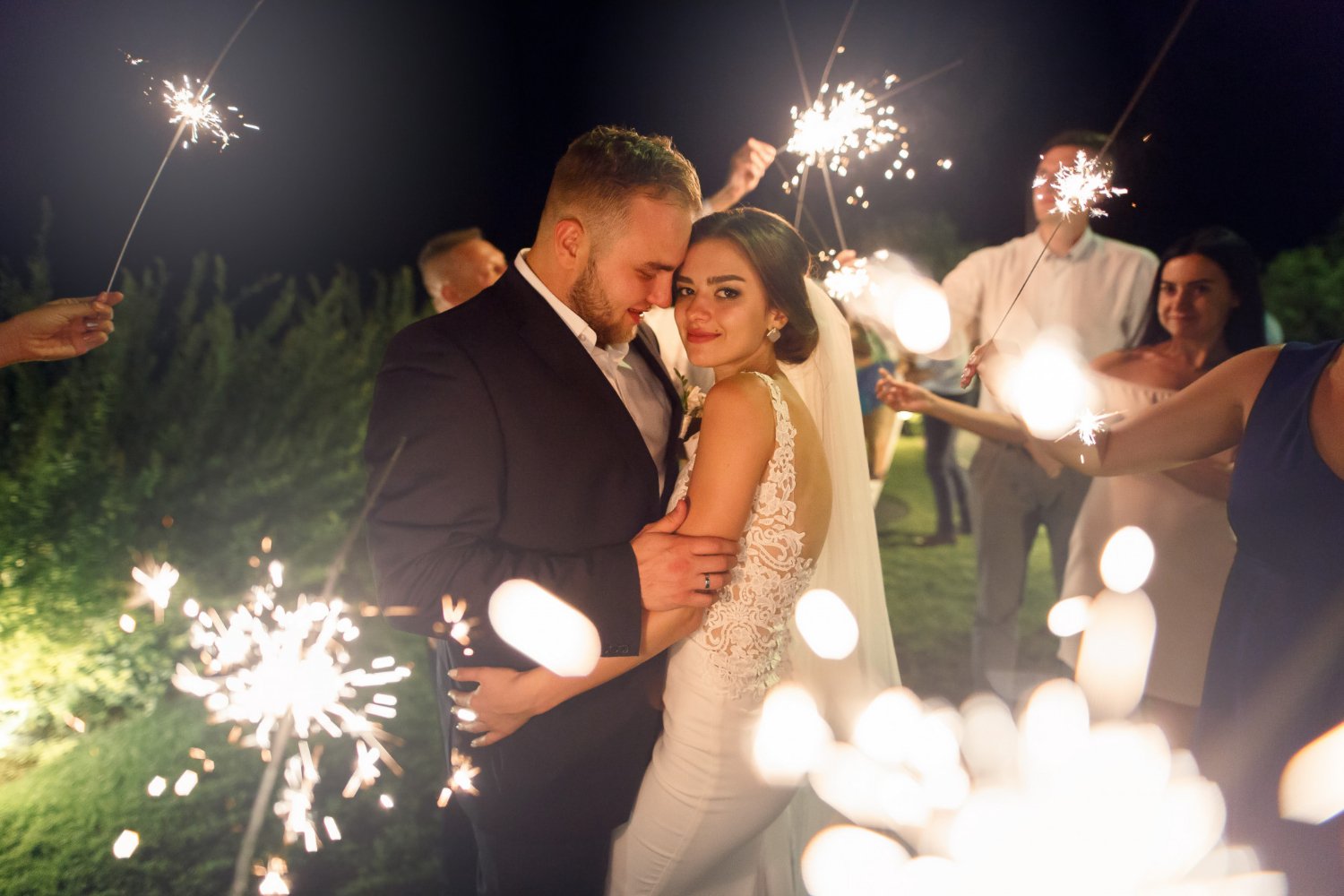
Conclusion and Considerations
When it comes to officiating your own wedding, there are several important factors to consider before making a decision. In this conclusion and considerations section, we will explore the significance of ensuring legal recognition and carefully checking state laws and policies. These vital sub-sections will help you determine whether officiating your own wedding is the right path for you.
It is important to note that in some states, self-uniting marriages are recognized, while in others, a third party must perform the ceremony. It is essential to research and understand the legal requirements in your specific location before proceeding with self-officiation. By doing so, you can ensure that your wedding is not only meaningful but also legally binding.
Importance of Ensuring Legal Recognition
Legal recognition is essential for any marriage, especially self-solemnizing ceremonies. It ensures the union is valid and recognized by the state. Each state has its own requirements for self-uniting marriages, which couples must follow to avoid legal consequences.
Research and documents must be obtained to meet the state's requirements before the ceremony. This way, the marriage will be acknowledged and protected.
Some states may not recognize self-uniting ceremonies, or have limited forms. Couples should consult their local government before making plans. Experts, such as attorneys or wedding officiants, can provide guidance to ensure compliance.
Self-solemnizing can be private and cost-effective, but legal recognition is vital. State laws and policies need to be followed, so the union is legally valid and protected.
Checking State Laws and Policies Carefully
When planning a self-solemnized marriage, check your state's laws and policies carefully. Each state has its own regulations. Become familiar with them to make sure your marriage is legally recognized.
- Look for age requirements or extra documents you may need.
- Seek legal advice or help from a professional. This will help you fulfill legal requirements and avoid trouble.
Checking state laws is part of planning a meaningful, legally recognized self-solemnized marriage ceremony. Take the time to understand the legal requirements and make your special day an unforgettable experience that is within the law.
Five Facts About Officiating Your Own Wedding:
- ✅ Couples can marry themselves without a judge or officiant, also known as self-solemnizing, and it is legal and recognized throughout the U.S. (Source: mlainephotography.com)
- ✅ Self-uniting or self-solemnizing marriage ceremonies are permitted in some states including Colorado, Pennsylvania, Wisconsin, Montana (with a Declaration of Marriage form), and may be possible in California with a special 'non-clergy' marriage license. (Source: theamm.org)
- ✅ In some states, witnesses may be required, but in Colorado, couples can add their pets as witnesses by stamping their paw on the marriage license. (Source: adventureinstead.com)
- ✅ Self-solemnizing is a good option for adventurous couples eloping outdoors as it removes the need to hire an officiant, and it can also save money. (Source: adventureinstead.com)
- ✅ Couples can incorporate various meaningful activities into their self-officiated wedding ceremony, such as reading vows, a hand-fasting ceremony, planting a tree, or painting art together. (Source: brwest.com)
- ✅ Marriage certificates obtained through self-solemnizing are often recognized not only throughout the U.S. but also by other countries. (Source: mlainephotography.com)
FAQs about Can You Officiate Your Own Wedding ?
Can I get married without an officiant or judge?
Yes, you can marry yourself without the need for an officiant or judge. This is known as self-solemnizing and is legal and recognized throughout the U.S.
What are the benefits of self-solemnizing?
Self-solemnizing removes the need to hire an officiant, making it a good option for adventurous couples eloping outdoors. It also removes the need to coordinate with another vendor's schedule or have anyone else at the ceremony. Marriage certificates obtained through self-solemnizing are often recognized by other countries.
Which states allow self-solemnizing ceremonies?
The states that offer self-uniting or self-solemnizing marriage ceremonies are Pennsylvania, Colorado, Wisconsin, and Montana (which offers a Declaration of Marriage form). In California, couples may be able to self-unite if they purchase a special "non-clergy" marriage license and have two witnesses sign the license with them. However, whether or not it is allowed depends on the regulations in the state where the couple is getting married. It is important to read and understand the state's policies carefully and contact someone in the state directly for the most up-to-date information.
Do I still need witnesses for my self-solemnization ceremony?
While witnesses are not always required, some states may require witnesses to be present or for their signatures to appear on the marriage license. In Colorado, couples can even add their pets as witnesses by stamping their paw on the marriage license. It is important to ensure your wedding ceremony is legally recognized by your state and country, for purposes such as immigration, health support, children, and taxes.
What kinds of activities can we do during a self-solemnization ceremony?
There are many options for activities at a self-solemnization ceremony, such as reading vows, hand-fasting ceremonies, mixing sand, planting a tree or plant, painting and creating art together, reading favorite passages, and singing or playing music. A photographer can still be present while using a long lens to give distance and privacy.
What is the process for getting legally married through self-solemnization?
To get married through self-solemnization, you need to visit the local office of the county clerk to apply for a marriage license in a state where it has been legalized. Some states allow for self-uniting or self-solemnizing marriage ceremonies, but it is important to check the laws in each state before planning your ceremony. You need to present all required documents, pay the fee, and follow the regulations and policies of performing marriage in your state. From the day of your elopement, you get 35 days to apply for a license and 63 days to return the license and receive your official marriage certificate.
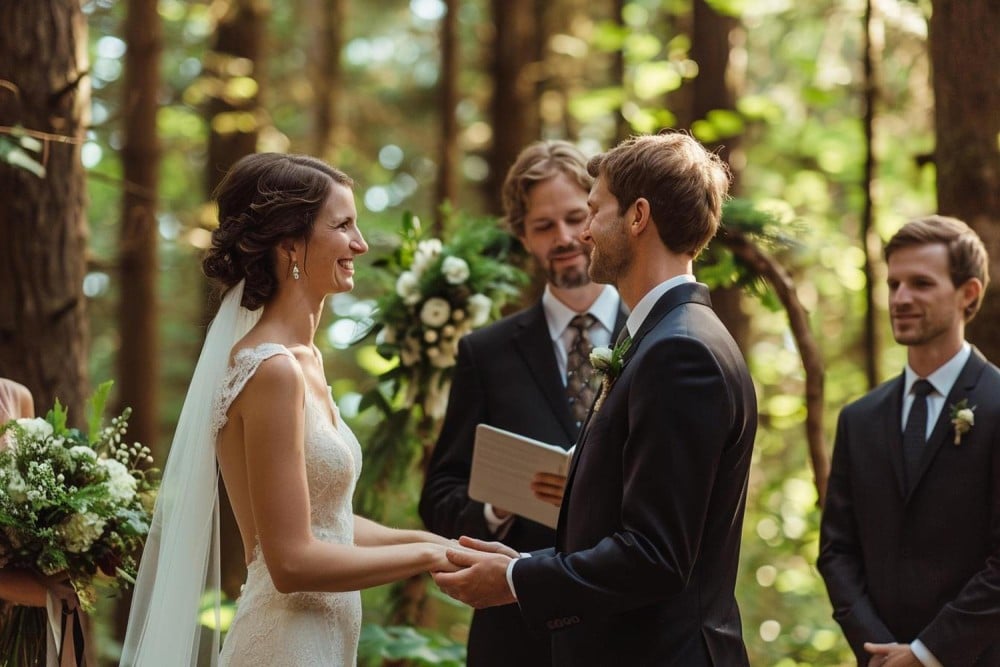 How to become a wedding officiant in tennessee ?Read more
How to become a wedding officiant in tennessee ?Read more How to bustle a tulle wedding dress ?05/21/2024Posted in: Wedding Fashion & StyleRead more
How to bustle a tulle wedding dress ?05/21/2024Posted in: Wedding Fashion & StyleRead more Planning Your Honeymoon Tips for an Unforgettable Trip05/20/2024Posted in: Wedding PreparationsRead more
Planning Your Honeymoon Tips for an Unforgettable Trip05/20/2024Posted in: Wedding PreparationsRead more The Dos and Donts of Wedding Guest Etiquette05/16/2024Posted in: Wedding Traditions & EtiquetteRead more
The Dos and Donts of Wedding Guest Etiquette05/16/2024Posted in: Wedding Traditions & EtiquetteRead more The Importance of PreWedding Counseling What You Should Know05/13/2024Posted in: Wedding PreparationsRead more
The Importance of PreWedding Counseling What You Should Know05/13/2024Posted in: Wedding PreparationsRead more Can I wear beige to a wedding ?11/14/2023Posted in: Wedding Fashion & StyleOne of the most common questions when it comes to wedding guest attire is whether it's appropriate to wear beige to a...Read more
Can I wear beige to a wedding ?11/14/2023Posted in: Wedding Fashion & StyleOne of the most common questions when it comes to wedding guest attire is whether it's appropriate to wear beige to a...Read more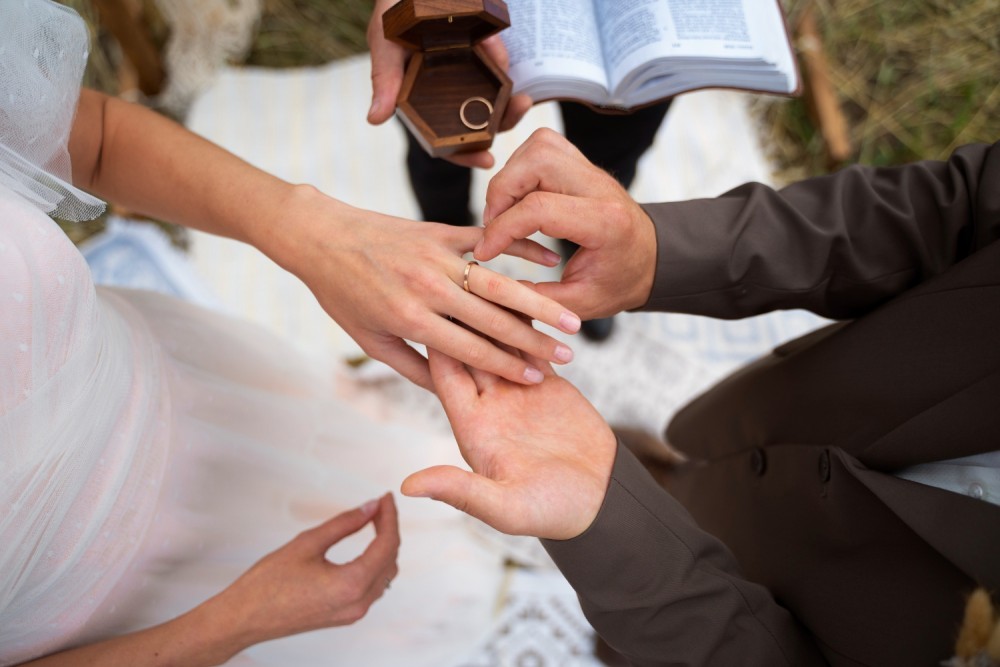 Do Jehovah Witnesses celebrate weddings ?02/29/2024Posted in: Wedding Traditions & EtiquetteJehovah’s Witnesses are known for their distinctive beliefs and practices, but what about weddings? In this...Read more
Do Jehovah Witnesses celebrate weddings ?02/29/2024Posted in: Wedding Traditions & EtiquetteJehovah’s Witnesses are known for their distinctive beliefs and practices, but what about weddings? In this...Read more What color shoes with navy dress for Wedding ?08/20/2023Posted in: Wedding Fashion & StyleMatching shoe color with navy dress When teaming shoe color with a navy dress, it's essential to decide on a hue...Read more
What color shoes with navy dress for Wedding ?08/20/2023Posted in: Wedding Fashion & StyleMatching shoe color with navy dress When teaming shoe color with a navy dress, it's essential to decide on a hue...Read more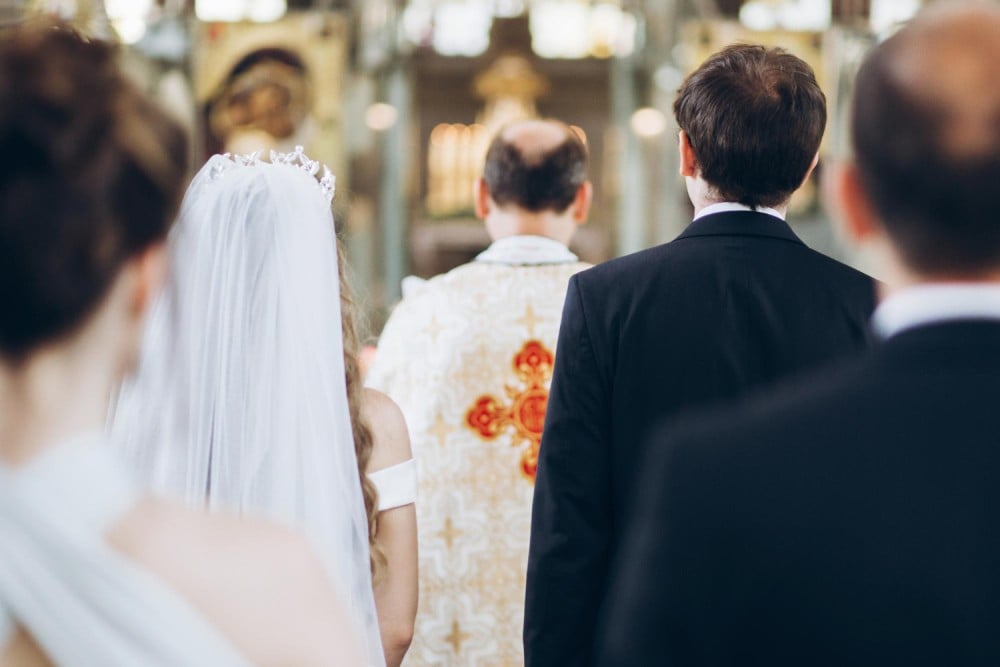 What to wear to a Church Wedding ?09/04/2023Posted in: Wedding Fashion & StyleAre you attending a church wedding and unsure about the dress code? Our latest article provides a deep dive into the...Read more
What to wear to a Church Wedding ?09/04/2023Posted in: Wedding Fashion & StyleAre you attending a church wedding and unsure about the dress code? Our latest article provides a deep dive into the...Read more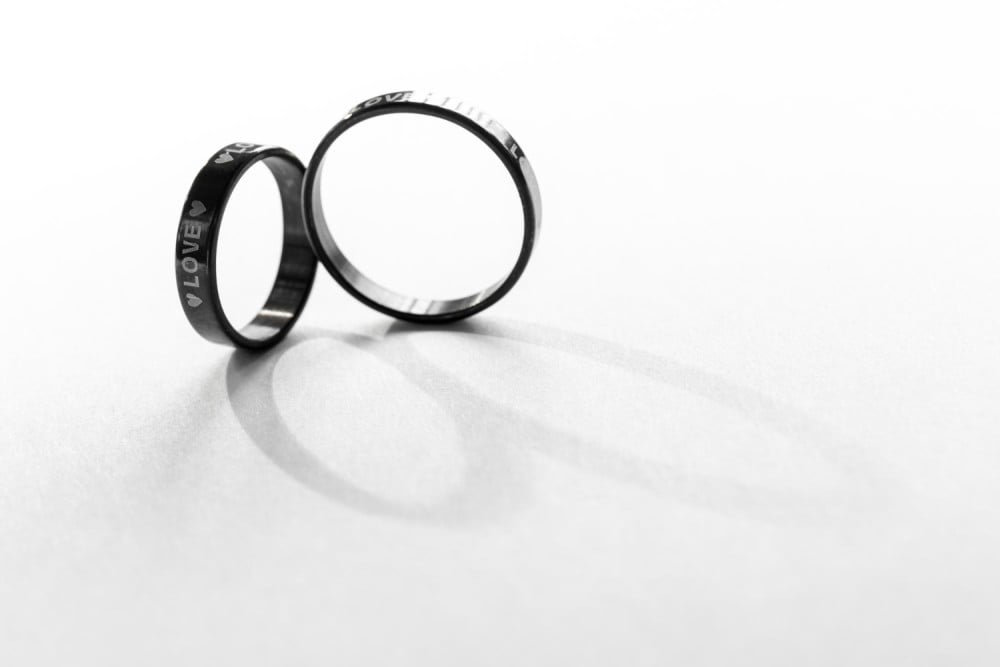 What does a black wedding ring mean ?06/12/2023Posted in: Miscellaneous Wedding AspectsWedding rings are a traditional symbol of love and commitment, but their style and design can vary greatly. In recent...Read more
What does a black wedding ring mean ?06/12/2023Posted in: Miscellaneous Wedding AspectsWedding rings are a traditional symbol of love and commitment, but their style and design can vary greatly. In recent...Read more How to become a wedding officiant in tennessee ?06/27/2024Looking to become a wedding officiant in Tennessee but not sure where to start? This comprehensive guide will walk...Read more
How to become a wedding officiant in tennessee ?06/27/2024Looking to become a wedding officiant in Tennessee but not sure where to start? This comprehensive guide will walk...Read more How to bustle a tulle wedding dress ?05/21/2024Posted in: Wedding Fashion & StyleAre you a bride-to-be with a tulle wedding dress and wondering how to bustle it for the big day? Look no further!...Read more
How to bustle a tulle wedding dress ?05/21/2024Posted in: Wedding Fashion & StyleAre you a bride-to-be with a tulle wedding dress and wondering how to bustle it for the big day? Look no further!...Read more Planning Your Honeymoon Tips for an Unforgettable Trip05/20/2024Posted in: Wedding PreparationsPlanning your honeymoon is an exciting and important step in beginning your life together as a married couple. From...Read more
Planning Your Honeymoon Tips for an Unforgettable Trip05/20/2024Posted in: Wedding PreparationsPlanning your honeymoon is an exciting and important step in beginning your life together as a married couple. From...Read more The Dos and Donts of Wedding Guest Etiquette05/16/2024Posted in: Wedding Traditions & EtiquettePlanning to attend a wedding soon? Make sure you brush up on your wedding guest etiquette to ensure you have a great...Read more
The Dos and Donts of Wedding Guest Etiquette05/16/2024Posted in: Wedding Traditions & EtiquettePlanning to attend a wedding soon? Make sure you brush up on your wedding guest etiquette to ensure you have a great...Read more The Importance of PreWedding Counseling What You Should Know05/13/2024Posted in: Wedding PreparationsAre you and your partner considering pre-marriage counseling but not sure what to expect? This article is here to...Read more
The Importance of PreWedding Counseling What You Should Know05/13/2024Posted in: Wedding PreparationsAre you and your partner considering pre-marriage counseling but not sure what to expect? This article is here to...Read more










.jpg)

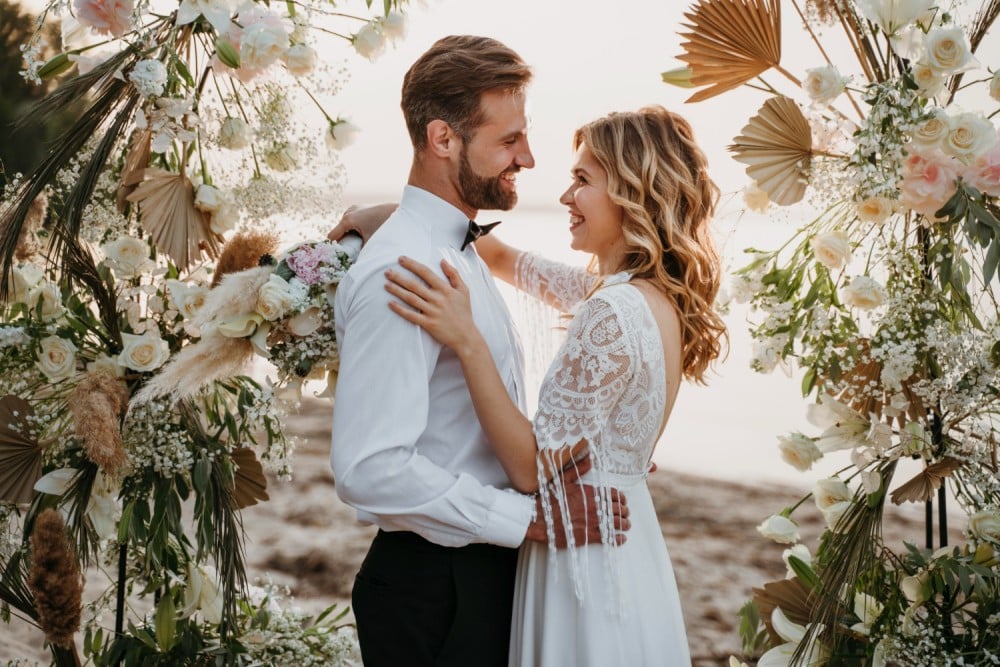
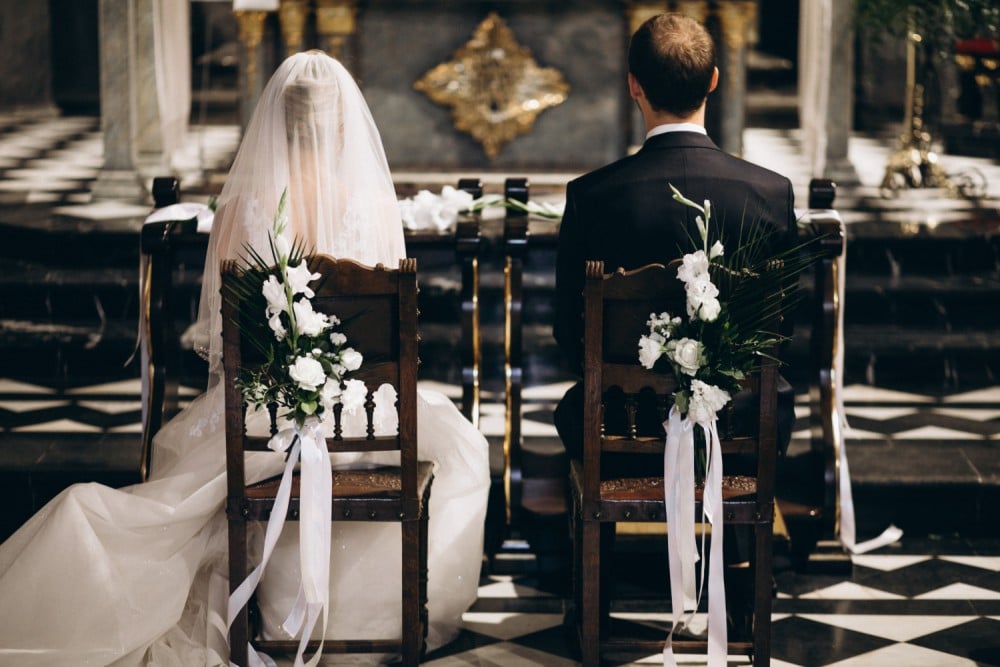
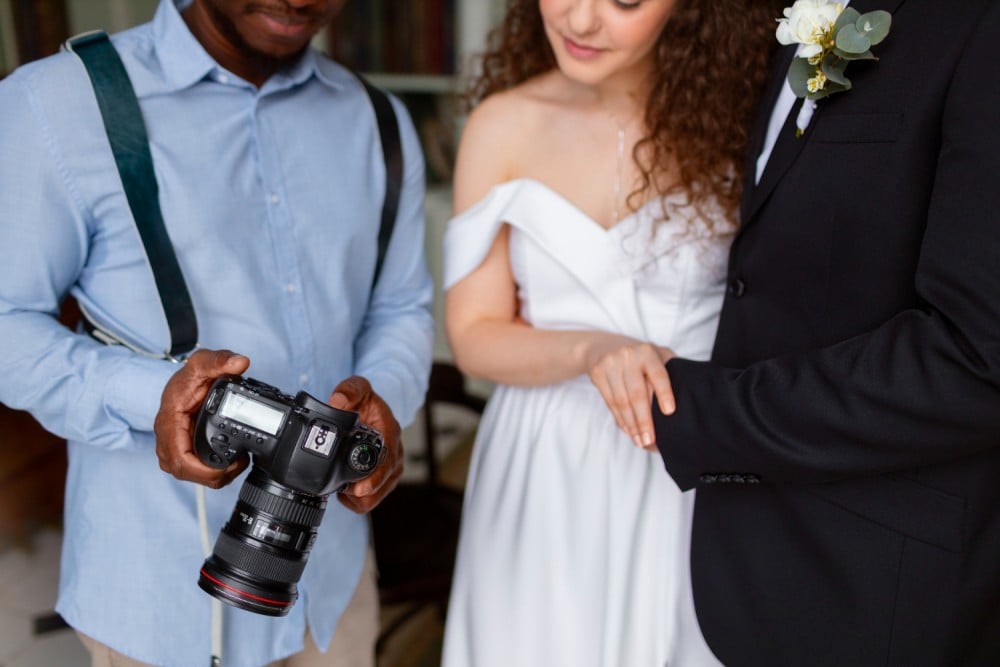


Top authors